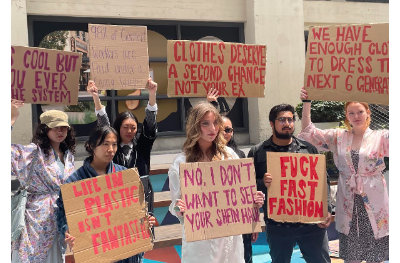
Remake and sustainable fashion advocates target SHEIN for environmental and ethical violations in protest outside LA headquarters.
In a dramatic display of solidarity and environmental activism, students from Los Angeles and the UK gathered on Earth Day to protest against SHEIN, one of the largest fast fashion companies. The demonstration, led by Lexy Silverstein and backed by the non-profit organization Remake, sent a powerful message about the urgent need for transparency and sustainability in the fashion industry.
Protesters, clad in robes and towels and carrying signs with slogans like “I’d Rather Be Naked Than Wear SHEIN,” assembled outside SHEIN’s Los Angeles headquarters. Their attire symbolized their rejection of the ultra-fast fashion model and the harm it causes to both the environment and worker’s rights.
“We demand transparency, an end to greenwashing, and a genuine commitment to sustainability,” said Lexy Silverstein, a prominent advocate for sustainable fashion. “It’s time for SHEIN to take responsibility for its actions, stop promoting hyper-consumerism, and prioritize the well-being of both the planet and its workers.”
The protest attracted significant attention, with chants and speeches highlighting SHEIN’s alleged exploitation of garment workers, including poor labor practices, low wages, and unsafe working conditions. The protestors also criticized the company’s impact on the environment, citing excessive textile waste and pollution from its manufacturing processes.
Harmony Richards, Co-Community Organizer for Remake Los Angeles, echoed these concerns, emphasizing the broader implications of fast fashion’s impact on the environment and workers’ rights. “Shein is notorious for poor labor practices, design theft, and overall perpetuating overconsumption,” she said. “We want to raise awareness about these issues and push for a more sustainable and ethical fashion industry.”
While the protest was organized by a small group, its impact resonated with passersby and on social media. The goal was to raise awareness and encourage people to reconsider their fashion choices, promoting sustainable alternatives such as thrifting, upcycling, and supporting ethical fashion brands.
Silverstein and her fellow activists intend to continue their efforts against fast fashion, with plans for additional protests and campaigns to demand accountability from SHEIN and other companies in the industry. “We’ll keep speaking out until these companies take real action,” Silverstein said. “We can’t afford to be silent when so much is at stake—for the planet and for the people making our clothes.”


